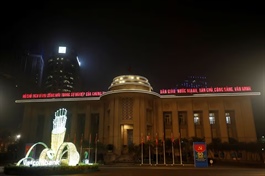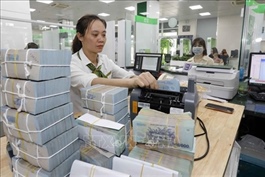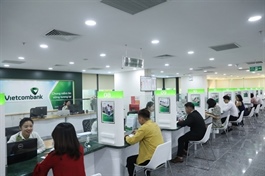Sustainable banks the way ahead for success
Sustainable banks the way ahead for success
Vietnam’s financial sector is increasingly embracing sustainability practices, although challenges like the need for a comprehensive legal framework, skilled personnel, and enhanced data management remain areas for improvement.

Environmental, social, and governance (ESG) principles are increasingly becoming the bedrock of business practices, particularly in the banking and financial sectors, said PwC chairwoman Dinh Thi Quynh Van at a seminar last week.
“Implementing ESG principles allows financial institutions not just to pioneer transformation within their own industry, but also to spearhead the adoption of these principles across various sectors through sustainable finance,” she explained.
Several Vietnamese banks are not only adopting ESG standards themselves, but are also actively assisting their clients in embracing these principles.
Tran Phuong, deputy CEO of BIDV, said, “By November 30, we had extended green credit to over 1,500 clients across 1,900 projects, with a total outstanding loan amounting to over $3 billion, which is nearly 5 per cent of the bank’s total loan portfolio.”
Particularly, BIDV has distinguished itself as the first domestic bank to develop a sustainable loan framework. These investments predominantly target clean and renewable energy, accounting for over 80 per cent of the funding, followed by environmental protection and disaster mitigation initiatives.
In the agricultural sector, critical to Vietnam’s economy, Agribank has been proactive in implementing ESG practices.
Nguyen Thi Thu Ha, head of the Financial Institutions Department and deputy head of the ESG Steering Committee at Agribank said, “With a significant portion of our lending in agricultural and rural sectors, we have integrated ESG considerations into our risk management and business strategies, and are actively engaging in community development.”
Within the private banking sector, institutions including MB, SHB, and ACB are allocating considerable resources towards sustainable lending initiatives.
Pham Nhu Anh, CEO of MB Bank, also shared the bank’s comprehensive risk management framework and criteria for green credit across various sectors, including green energy, sustainable agriculture and forestry, and green industry.
“To qualify through the criteria for accessing green credit, businesses can commit to measurable emission reductions, adopt technologies that cut emissions by up to 20 per cent, or demonstrate current emissions at least 20 per cent lower than the market average,” Anh said.
“A key highlight of MB Bank’s strategy is the allocation of 90 per cent of its funding towards renewable energy and clean energy projects. Looking ahead, we aim to broaden our support to industrial businesses, especially those undergoing a green transition,” Anh added.
For ACB, the bank’s initiatives extend beyond financing. It is driving digital transformation, reducing paper usage, and enhancing environmental awareness among our staff, explained chairman Tran Hung Huy.
“ESG is a multi-decade vision. It’s about setting the right course from the outset, as the goals will evolve over time,” Huy said.
However, Phuong of BIDV believes that the absence of a comprehensive legal framework for green classification and green bond issuance is a significant barrier.
“This hampers the development of corresponding guidance from the State Bank of Vietnam, affecting the deployment in commercial banks,” Phuong said.
Phuong also pointed out the global challenge of emissions data collection, crucial for environmental impact assessment in banking.
“Identifying and collecting emissions data remains a complex issue, affecting credit evaluation and overall emissions measurement. Moreover, the lack of skilled personnel in environmental and sustainability aspects within the banking sector is another hurdle. Expertise in these specialised areas is still quite limited within the banking workforce,” he added.
Addressing the state of Vietnamese enterprises, Phuong also observed that most are only beginning to align with sustainable development and ESG practices.
“There is a significant need for time and resources to train and support businesses, especially large enterprises, in transitioning from traditional commercial operations to sustainable development,” he said.
Pham Do Nhat Vinh, head of Financial Services at KPMG Vietnam, stressed the necessity of adapting to carbon accounting to future-proof banking operations, and underscored the importance of assessing environmental risks, particularly in nature and biodiversity.
“Effective integration into the carbon market is essential, and robust crisis management and stakeholder engagement strategies are also crucial,” Vinh said.
Regarding to roadmap for banks to incorporate ESG practices, he believed that risk management frameworks play a key role.
“Effective risk assessment and management frameworks are key in mitigating potential ESG risks. These frameworks help in proactively identifying and managing ESG-related risks,” he said. “Establishing carbon budgets and conducting climate resilience tests are imperative for banks, along with preparing a robust framework for managing environmental and social aspects.”


























